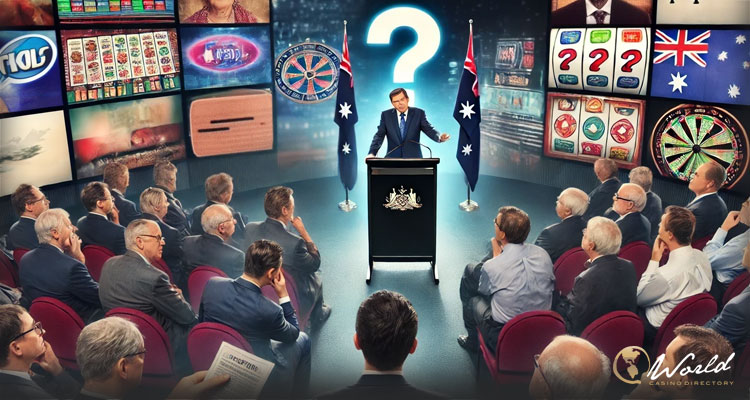Last month, Australian Prime Minister Anthony Albanese sparked confusion when he cited a statistic during a parliamentary session that left experts and advocates scratching their heads. Responding to a question from Independent MP Zali Steggall about gambling harm, Albanese brought up the issue of lotteries to justify his government’s decision not to impose a total ban on gambling advertising. His claim that around 15% of gambling harm stemmed from lotteries raised eyebrows, as the source of this figure was unclear.
Albanese argued that while his government has taken more action against harmful gambling than any other, the majority of gambling harm—around 70%—comes from poker machines. He then stated that about 15% of harm is linked to lotteries, which led to confusion among experts who could not trace the origin of these figures. The prime minister’s comments seemed to divert attention away from the issue of sports betting and online wagering, which has been the focus of ongoing debates around gambling reform.
Experts Challenge the PM’s Claims
Samantha Thomas, a professor of public health at Deakin University and a prominent researcher in gambling harms, expressed disappointment with the prime minister’s remarks. Thomas, who has extensively studied the effects of gambling advertising on normalizing betting behaviors in children, was unable to verify the prime minister’s claim. She noted that she and her colleagues immediately sought the source of these statistics but were unable to identify them in any publicly available data. Professor Thomas even reached out to the Department of Communications for clarification on the figures but reportedly received no response. This lack of transparency only added to the confusion surrounding the prime minister’s statement.
Independent Senator David Pocock also raised concerns, questioning whether Albanese was relying too heavily on information provided by industry interests rather than experts in the field. In response to these concerns, the Senator successfully moved a motion in the Senate, asking the prime minister to produce any documents that could substantiate his claims about lotteries’ contribution to gambling harm. However, the acting prime minister, Richard Marles, stated that Albanese was relying on “a recollection of published material” and that no documents were available to back up his statement.
Senator Pocock was unimpressed with this response, according to ABC News, pointing out that no experts had been able to find such published material. He speculated that the figures cited by the prime minister might have been influenced by Peter V’landys, the chairman of the Australian Rugby League Commission and CEO of Racing NSW, who has been an outspoken opponent of a total ban on gambling ads.
Industry Influence and Conflicting Figures
V’landys had previously referenced similar statistics in a media interview, claiming that 15% of gambling harm comes from lotteries, 70% from poker machines, and smaller percentages from racing and sports betting. However, the source of these statistics remains unclear, as V’landys did not provide any evidence to support his claims.
The confusion over these figures comes at a time when the federal government is being urged to take stronger action on gambling reform. The parliamentary inquiry into online betting harms, chaired by the late Labor MP Peta Murphy, had recommended a ban on all gambling advertising, along with other measures to reduce the harm caused by online betting and sports wagering. The inquiry’s findings were based on months of evidence gathering and research, yet Albanese’s comments on lotteries seemed to sidestep the core issue of sports betting.
Professor Thomas, along with other public health experts, has argued that the prime minister’s reliance on unverifiable data undermines efforts to address the growing issue of gambling harm in Australia. She emphasized the need for the government to base its policies on credible, independent research rather than industry-driven narratives.
Gambling-Related Harm: A National Concern
Australia’s gambling statistics paint a grim picture of the nation’s relationship with betting. The most recent Australian Gambling Statistics (AGS) report revealed that Australians lost a staggering $31.5 billion to gambling in 2022-23, making it the highest per capita loss in the world. Of this total, $15.8 billion was lost to poker machines, $8.4 billion to wagering, and $3.1 billion to lotteries. While lottery losses are significant, they pale in comparison to the harm associated with other forms of gambling, such as sports betting and poker machines.
Despite the prime minister’s claims, it’s rare to hear of lottery-related gambling harm, such as stories of financial ruin or gambling-induced suicide. Most accounts of severe gambling-related problems are tied to online betting or poker machines, as demonstrated by the Gurney brothers, who lost nearly $10 million through a family business to a gambling addict. Similarly, stories like that of “Kate,” who lost her brother to gambling addiction, often involve betting agencies rather than lotteries.
Calls for More Comprehensive Reform
The Albanese government has faced increasing pressure to respond to the parliamentary inquiry’s recommendations, which were handed down more than 15 months ago. Advocates for reform, including Senator Pocock, have called on the government to prioritize the findings of the inquiry and implement policies that will effectively reduce gambling harm.
Martin Thomas, CEO of the Alliance for Gambling Reform, cited by The Border Mail, has also raised concerns about the government’s apparent reluctance to fully address the harms caused by online sports betting. He highlighted that while much attention is given to poker machines and lotteries, the fastest-growing area of gambling, especially among young people, is online betting. Thomas warned that delaying comprehensive reform only allows more Australians to become ensnared in harmful gambling habits.
The government’s hesitance to fully embrace the inquiry’s recommendations has left many within its own ranks frustrated. As the debate continues, experts and advocates hope the prime minister will shift focus from industry figures and base his rhetoric on verified data, paving the way for more meaningful action on gambling reform.




